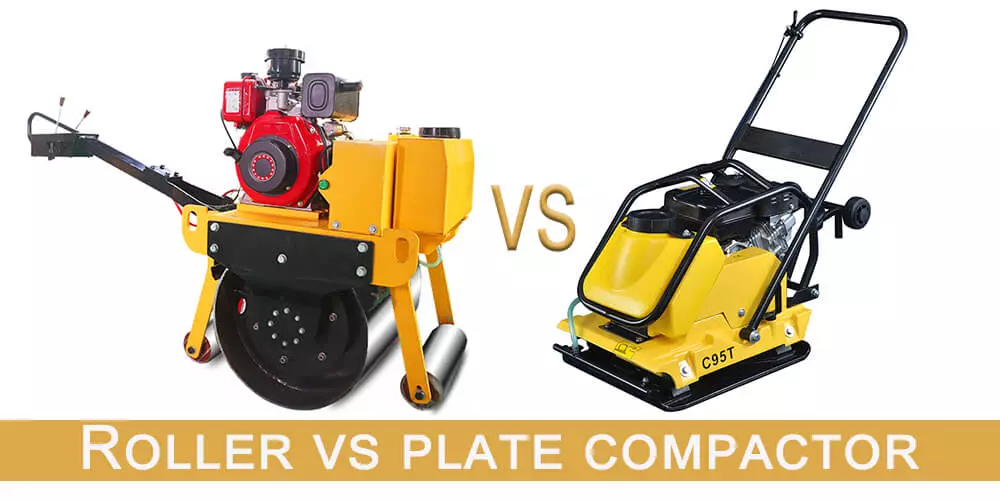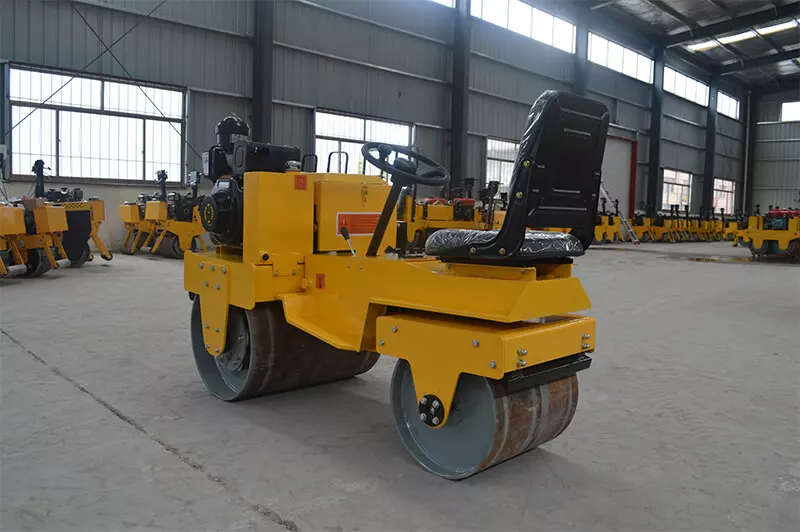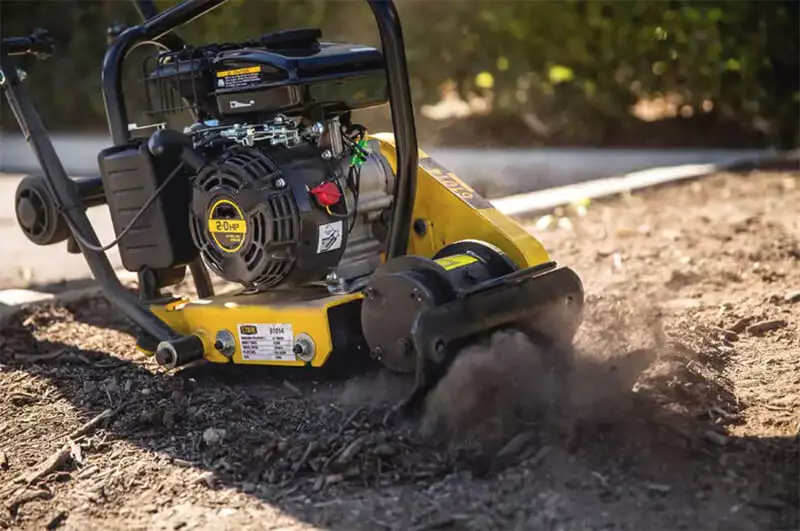23Dec 2023
table of contents
Whether you need the right equipment to compact a driveway or a main road to get the job done, it can mean the difference between getting the job done and the project budget. While the terms plate compactor and roller are often used interchangeably, mechanical differences can change how a project is completed.
How do you choose which is best for your project, from rollers to plate compactors?

Selecting the right compaction equipment for a specific job can be challenging. So, in this article, we'll take a closer look at the advantages, types, and typical application differences that both bring. Then learn what to consider when choosing between the two, making your decision easier whether you're a seasoned professional or new to the fascinating world of architecture.
Now, let's break down what roller and plate compactors are.
Road rollers are rugged machines designed for delicate soil and asphalt compaction tasks. These heavy-duty giants have durable frames that often have smooth or padded wheels that help transfer weight and energy to the ground efficiently. They are typically powered by diesel engines and are designed to withstand the harsh conditions of long-term use in demanding construction environments.
There are many types of rollers, each tailored to specific compaction needs. The main types are smooth wheel rollers, pad wheel rollers and pneumatic tire rollers. Smooth wheel rollers excel at flattening surfaces, while pad wheel rollers with segmented wheels provide compaction precision. Pneumatic tire rollers equipped with rubber tires provide uniform compaction on surfaces such as asphalt.
Large area compaction: Road rollers are good at compacting large areas, ensuring uniform density and stability over large areas.
Asphalt Paving: These machines play a key role in road construction by compacting the asphalt layer, improving durability and smoothness.
Foundation work for large projects: Road rollers are essential in the foundation phase of large projects, providing the foundation for subsequent construction phases.
Advantage:
High compaction efficiency over large areas.
Versatility in handling a variety of soil types and materials.
Effectively achieve smooth road surface.
limit:
Restricted movement in confined spaces.
Fuel consumption is high, especially for larger models.
May not be cost effective for small projects.

Plate compactors are compact power units with streamlined design and maneuverability. The base of these machines is constructed of heavy-duty steel plates and is designed to deliver concentrated power efficiently. Powered by a gasoline or diesel engine, plate compactors offer versatility and precision in compacting a variety of materials.
Veneer type: Standard compactor with veneer for simple compaction tasks.
Reversible type: Designed for improved maneuverability, these compactors can move forward and backward, making them ideal for tight spaces.
Vibratory plate compactors: These vibrating plate compactors are equipped with a vibrating mechanism that effectively handles different soil types by breaking up the voids.
Small area compaction: Plate compactors excel at compacting smaller areas, providing precision and control where larger machines may struggle.
Paving and patios: Ideal for the fine compaction required for paving and patio projects, ensuring a stable and even surface.
Trench and foundation works: Plate compactor machines are vital in trench and foundation projects, making it easy to compact soil in confined spaces.
Advantage:
High mobility and accessibility in confined spaces.
Suitable for small and medium-sized projects with high cost performance.
Versatile and capable of handling a variety of materials including soil, gravel and asphalt.
limit:
Large projects have limited efficiency compared to large compaction equipment.
May not be able to achieve the same level of compaction depth as heavy machinery.
Operator fatigue may occur when used for extended periods of time, especially on manual models.

Project size and type: Consider the size and nature of the project. Rollers are best suited for larger projects and can effectively compact large areas. Plate compactors, on the other hand, excel at smaller or more complex tasks, excelling on smaller projects, providing maneuverability and precise compaction that may not be practical with larger rollers.
Soil type and material compaction requirements: Evaluate the properties of soil and compacted materials. The weight and size of the roller can effectively handle a variety of soil types, making it versatile. But depending on its design and weight, a plate compactor may be more selective and better suited to specific soil types.
Maneuverability: Plate compactors are more maneuverable due to their compact design and greater maneuverability, and may be preferred over rollers in tight spaces where rollers face constraints.
Required efficiency and compaction power: Determine the required degree of compaction. Compactors provide high compaction capacity over large areas, while plate compactors provide precise, efficient compaction in smaller spaces.
Cost-effectiveness: Consider the budget constraints of the project. While the upfront cost of a roller may be higher, a plate compactor may be more cost-effective for certain applications.
Ease of use: Plate compactors are generally easier to operate and suitable for operators of varying skill levels. Rollers may require more specialized training.
Maintenance: Maintenance requirements for plate compactors are generally simpler than for rollers, whose systems can be more complex.
Transportation: Due to they are compact size and less weight, plate compactors are easier to transport, whereas road rollers may require specialized transportation.
Fuel efficiency: Because of tend to be more fuel efficient, making plate compactors become a cost-effective choice for intermittent use smaller projects.
Versatility: Compactors can be used to handle a variety of materials and compaction tasks, while plate compactors offer versatility in range and precision.
As we explore the nuances of these machines, it becomes clear that the right choice depends on a thorough understanding of the project requirements and careful consideration of various factors.
Understanding the differences between rollers and plate rollers on these factors and making informed decisions based on project-specific needs can ensure construction professionals select the most appropriate compaction equipment for optimal results and efficiency. Overall, for large projects with large surface areas and different soil types, rollers (drum compactors) stand out for their efficiency and versatility. In contrast, plate compactors excel on small to medium-sized projects, offering maneuverability, precision and cost-effectiveness in limited spaces.
During the process of selecting the ideal compaction equipment, consider consulting with an expert in the field. Their insights and expertise can guide you through the decision-making process, ensuring your choices fit seamlessly with your project's unique needs. If you find yourself in need of quality compaction equipment, take the next step by consulting a trusted supplier like BISON. BISON plate compactors combine cutting-edge technology with reliability to provide tailor-made solutions to meet your specific construction needs.
inquiry form here
BISON BLOG, All the latest news and views from Bison Machinery.